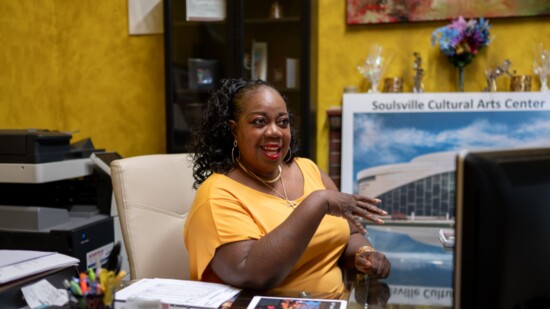At age six, Lar’Juanette Williams was encouraged by a mentor at the Art Linkletter Totten Dance School in Memphis to compose and perform a dance that reflected her African American heritage. “They unleashed a monster,” she says. “From there I began writing theater pieces, singing with school choruses and acting.”
Lar’Juanette’s career in the performing arts has taken her to Los Angeles, New York and other major cities by way of the University of Memphis and the University of North Texas, where she fine-tuned her craft while studying Commercial Music and Communications. She admits that the initial post-graduate move to Los Angeles was intimidating. But what followed was a career filled with high-profile roles both as a performer and, later, as a producer.
After a series of trial-and-error experiences, Lar’Juanette landed her first job in the industry playing the character Effie White in the musical drama Dreamgirls. She explains, “It was a lucky break, and I received glowing reviews from sold-out crowds.” It was a providential role that she would soon perfect and reprise several times including a national tour.
Lar’Juanette dedicated time to further her education, earning a master’s degree in sociology from the University of Southern California and pursuing advanced studies in production arts administration and performance pedagogy at the Stella Adler Studio of Acting in New York. With significant education and experience gained along her journey guided by prayerful decisions, Lar’Juanette found herself in the right place at the right time on multiple occasions. Her career exploded with roles both on stage and behind the scenes appearing in movies Ghosts of Mississippi and Virtuosity as well as television shows such as Chicago Hope, ER, NYPD Blue and Seinfeld.
Faith and family prompted her return to Memphis in 1997 where she remained busy as a producer until an opportunity arose across the state. As the Associate Producer of the Historic Bijou Theatre in Knoxville, Tennessee, she oversaw the production of 35 mainstage productions, 20 tours, developed a theater academy and served more than 350,000 patrons in a three-and-a-half-year period.
Family again drew her back home to the River City in 2015 when her brother fell ill. This time, she found her way to the Memphis Black Arts Alliance, a 40-year-old arts organization in Soulsville. She recalls a chance meeting with the organization’s founder, “I had the pleasure of seeing the legendary Bennie Nelson West, founder of the Memphis Black Arts Alliance, and she shared that she was retiring and was looking for her successor.” Lar’Juanette was hesitant to accept but says Bennie was persistent.
Again, allowing her faith to lead, Lar’Juanette says God assured her that this was the right next step and, in fact, a dream come true. “I did not have the first clue as to how to make this happen, but the Memphis Black Arts Alliance did, and they helped find funding for me to present my work along with help and assistance,” she explains. “Now was the opportunity to take all that I’d learned throughout the years and the many places and to apply everything here in my hometown.”
In addition to providing space for Memphis-area artists to work, write, create, exhibit and promote their work, the Memphis Black Arts Alliance showcases local artists through original, local performances. The Alliance has presented more than 30 music and dance groups on the Overton Park Shell stage. Additionally, they have collaborated with the Memphis Symphony Orchestra to elevate some of Memphis’ most talented vocalists at the Sunset Symphony as well as the Magic of Memphis Christmas Spectacular.
The Alliance is an ideal stage for Lar’Juanette to share her credentialed wisdom and devoted passion about Memphis as a creative city. “We are significant and had it not been for the creativity that came from our city, we would not have the blues, jazz, soul, rock, country or any of it.” This legacy of music started back in 1870s, she explains, when Robert Church purchased some land that is now called Beale Street. “He sold parcels to entrepreneurs who launched multi-artistic genres of musical creativity, and artists of color from all over the country flocked here to live and work.”
Lar’Juanette points out that the artistic superiority of Memphis is celebrated and honored all over the world. “We are artists and administrators, executives and producers of that art. If we can get past the things that separate us, declaring truth, and realize that none of this is without all of us...working together hand in hand, then we will see a healed community, creating the quality of life that we all deserve.”
For a listing of upcoming events, visit memphisblackarts.org.
"Had it not been for the creativity that came from our city, we would not have the blues, jazz, soul, rock, country or any of it.”
"If we can get past the things that separate us...working together hand in hand, then we will see a healed community, creating the quality of life that we all deserve.”
